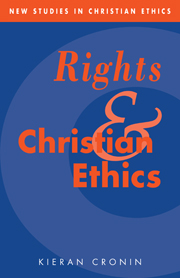Book contents
- Frontmatter
- Contents
- General editor's preface
- Preface
- 1 Metaethics: meaning and justification
- 2 Initial elucidation of rights-language
- 3 Conceptual scepticism and rights
- 4 Moral and theological scepticism
- 5 Imagination, metaethics and rights
- 6 Theological imagination and rights
- 7 Rights, power and covenant
- 8 Theological foundations of rights-language
- Epilogue
- Notes
- Index
8 - Theological foundations of rights-language
Published online by Cambridge University Press: 29 September 2009
- Frontmatter
- Contents
- General editor's preface
- Preface
- 1 Metaethics: meaning and justification
- 2 Initial elucidation of rights-language
- 3 Conceptual scepticism and rights
- 4 Moral and theological scepticism
- 5 Imagination, metaethics and rights
- 6 Theological imagination and rights
- 7 Rights, power and covenant
- 8 Theological foundations of rights-language
- Epilogue
- Notes
- Index
Summary
In this chapter my main intention is to take the major models of rights I have been using: freedom, power and covenant, and to relate them in turn to a further model which may be thought of as the ultimate foundation of rights. This model has been mentioned in passing throughout this work. It is the notion that humanity's dignity comes from being created in the image of God. I want to argue here that having and exercising rights are a vital aspect of that dignity, and that being made in God's image gives a specifically religious justifying reason for acting morally. I hope to show that the models of power, freedom and covenant are all related intimately to this ultimate model and are particular expressions of it.
Before examining this image model I need to treat briefly of the general debate, especially within Roman Catholicism, on the distinctiveness of Christian ethics. Then I shall mention some of the difficulties regarding the use of the language of God's rights and our having rights against God. Rejecting this approach as a foundation for rights I stress the view that rights are granted by God to human persons as part of our special status as images of his, partners in covenant, free and selfassertive co-workers with the Creator.
THE DISTINCTIVENESS OF CHRISTIAN ETHICS
Before I can consider the question of providing a Christian foundation for rights, the prior question of the possibility of a distinctive Christian ethics has to be faced. This debate has raged of late particularly among Roman Catholic theologians. In the following pages I shall rely heavily on Vincent Mac-Namara's discussion of the issues in his Faith and Ethics.
- Type
- Chapter
- Information
- Rights and Christian Ethics , pp. 233 - 266Publisher: Cambridge University PressPrint publication year: 1993



